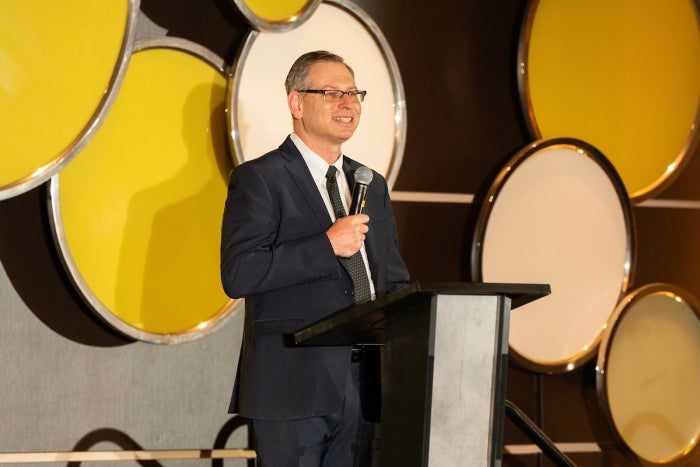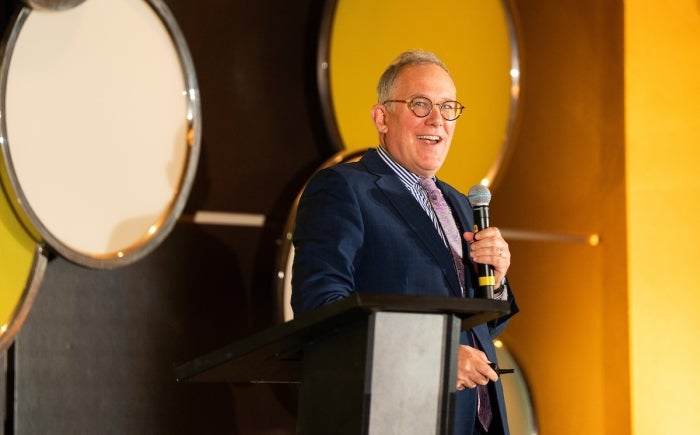Economic experts discuss where Arizona is headed

ASU Professor Dennis L. Hoffman speaks at the 60th annual ASU/PNC Bank Economic Forecast Luncheon on Dec. 6 in downtown Phoenix. Photo by Shelly Valdez/W. P. Carey School of Business
Arizona’s economy didn’t grow much in 2023, and the following year won’t fare much better. But the state and its residents should count their blessings, said one of its most respected financial experts.
“The U.S. economy is experiencing slower growth with moderating inflation but appears on track to avoid a major recession,” said Dennis L. Hoffman, director of ASU’s Office of the University Economist and the L. William Seidman Research Institute at ASU’s W. P. Carey School of Business. “Our resilience during the pandemic really showed. We wanted to work, and we demanded that. I think that’s what helped to sustain us.”
Hoffman presented his findings at the 60th annual Economic Forecast Luncheon on Wednesday in downtown Phoenix, sponsored by the W. P. Carey School of Business and PNC Bank.
“This luncheon has attracted business and government leaders annually to hear distinguished regional and national economists project business conditions for the next year,” said W. P. Carey Dean Ohad Kadan, who made his second appearance at the luncheon since joining the school in July 2023. Kadan added the school is vigorously pursuing four areas of business that are making a difference in the state and the world: manufacturing, artificial intelligence, sustainability and health care.
“A lot of exciting things are happening at ASU,” Kadan said.
In addition to Hoffman, speakers included Augustine Faucher, chief economist for PNC Financial Services Group, and Robert J. Barro, Paul M. Warburg Professor of Economics at Harvard University.
Hoffman said global tensions, federal rate hikes, high labor costs, declining real estate sales/home prices and eroding consumer confidence have led to a global economic downturn.
At the same time, the net worth of U.S. households is near record highs and unemployment is low, but foreclosures and bankruptcies rose after a series of federal rate hikes. This has led to a slight slowing in the Arizona economy even though its wages are outpacing the national average.
“It’s still a very, very healthy economy,” Hoffman said.
Pre-COVID-19, Arizona outpaced all U.S. states in job creation; now it’s 29th. Other lagging states include Nevada, Texas, Florida and Idaho, according to Hoffman. The state also lost 338,000 jobs during the pandemic but has added 512,000 in its recovery.
Arizona remains a popular place to live, said Hoffman, noting it’s the eighth fastest-growing state behind Florida, Idaho, South Carolina, Texas and South Dakota. It’s also the fourth fastest-growing metro area behind Dallas, Houston and Atlanta, adding more than 72,000 residents in the past year.
According to Hoffman, the state’s unemployment rate remains low, at 3.7%, thanks to five key industries in the Grand Canyon State, which accounts for three-fourths of the 66,500 private Arizona jobs added in Q3 2023.
The health care industry in Arizona added more than 17,600 jobs in the past year, twice as many jobs per year as a decade ago.
“Health care appears to be where the action is,” Hoffman said. “Very, very strong.”
The leisure and hospitality industries added approximately 12,500 jobs in 2023, up 3.6% and ranking 35 in the country.
Wholesale trade posted more than 7,300 new jobs in the past year, up 6.8%, ranking second in the country.
The professional/tech industry added approximately 6,500 jobs in Arizona last year, up 3.7%, giving it a rank of 20th in the nation.
The construction industry added around 4,800 jobs in 2023, up 2.5%, ranking 29th in the country. Hoffman noted that as of October 2023, Arizona employed almost 200,000 construction workers, the most in 15 years.
Faucher said the U.S. economy is in a “weird spot” because people are anxious about the rapid increase in federal interest rates over the past year and high inflation. However, he said the results from a small business survey they recently conducted offers another side of the coin.
“The economy, objectively speaking, is in good shape,” Faucher said. “We have strong growth. Small businesses have been through a lot over the past few years, but they’re feeling very good about how their companies are doing and their prospects.
Hoffman said Arizona’s prospects are hopeful as well. He said because Arizona offers businesses friendly tax and regulatory practices, it will draw new commerce and help sustain the state’s economy.
“Arizona magnetism means productive workers and businesses want to come and stay in Arizona,” Hoffman said. “Who doesn’t want to be here?”
Hoffman predicts in the next decade there will be job growth in the following industries: health care and social services; public administration; manufacturing; educational services; finance and insurance; and arts, entertainment and recreation.
And, of course, the state is gearing up to become the epicenter of the semiconductor research and development industry, leading the nation in semiconductor investment since 2020. This, and a few other factors, makes Hoffman optimistic about Arizona’s economic future.
“I’ve always believed in the spirit and resilience of Arizona,” Hoffman said. “From an economic perspective, we could have a little bump in the road next year. It could be a little soft, but probably not too soft.”
More Business and entrepreneurship

Honoring 2 decades of entrepreneurial impact on a global scale
Thunderbird for Good, the impact-driven initiative of Thunderbird School of Global Management at Arizona State University, is marking two decades of educational programs and initiatives dedicated to…

ASU and GoDaddy launch Student Athlete Venture Studio
In a groundbreaking initiative aimed at empowering college athletes beyond their playing careers, Arizona State University and GoDaddy teamed up to launch the first-of-its-kind Student Athlete…

Boosting entrepreneurship to meet the market's needs
America loves an entrepreneur — the home run king of all businesspeople.And at Arizona State University, we love them, too.Here’s a look at how ASU prepares business students, alumni, development…



